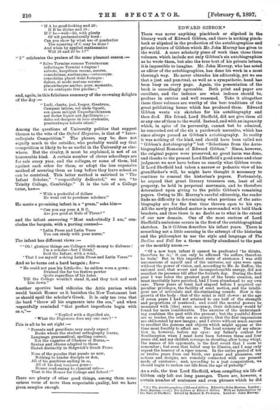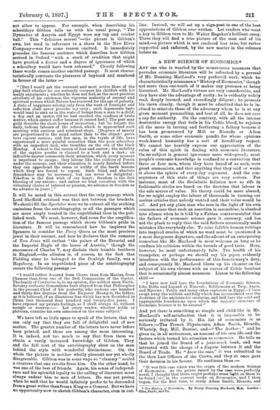EDWARD GIBBON.*
There was never anything pinchbeck or slipshod in the literary work of Edward Gibbon, and there is nothing pinch- beck or slipshod in the production of the autobiographies and private letters of Gibbon which Mr. John Murray has given to
the world. A more scholarly piece of work than these three volumes, which include not only Gibbon's six autobiographies
as he wrote them, but also the true text of his private letters, it is impossible to imagine. Mr. John Murray, who has acted as editor of the autobiographies, has done his work in a most thorough way. He never obtrudes his editorship, yet we see that a just and punctual, as well as a sympathetic, hand has been busy on every page. Again, the presentation of the book is exceedingly agreeable. Both print and paper are
excellent, and the indexes are what indexes should be, profuse in entries and well reasoned. Take it altogether these three volumes are worthy of the best traditions of the great publishing house which has produced them. Edward Gibbon wrote six sketches for his autobiography and then died. His friend, Lord Sheffield, did not give them all or any one of them to the world. Instead, and with an ingenuity which, in spite of its perversity, cannot but be admired, he concocted out of the six a patchwork narrative, which has since always passed as Gibbon's autobiography. In reality it was nothing of the kind, and should have been called not " Gibbon's Autobiography" but "Selections from the Auto- biographical Remains of Edward Gibbon." Since, however, the original papers were preserved, no great harm was done, and thanks to the present Lord Sheffield's good sense and clear judgment we now have before us exactly what Gibbon wrote. If Lord Sheffield had taken a narrow or pedantic view of his grandfather's will, he might have thought it necessary to continue to conceal the historian's papers. Fortunately, he argued that great literary treasures can, least of all property, be held in perpetual mortmain, and he therefore determined upon giving to the public Gibbon's remaining papers. Owing to Mr. Murray's careful editorship, the reader finds no difficulty in determining what portions of the auto- biography are for the first time thrown open to his eye. All the newly published matter is surrounded with bold black ,brackets, and thus there is no doubt as to what is the extent of our new domain. One of the most curious of Lord
Sheffield's omissions occurs in the first of the autobiographical sketches. In it Gibbon describes his infant years. There is something not a little amusing in the attempt of the historian and the philosopher to use the style and language of The Decline and Fall for a theme usually abandoned to the poet or the monthly nurse :- " Of a new born infant it cannot be predicated the thinks, therefore he is;' it can only be affirmed 'he suffers, therefore he feels.' But in this imperfect state of existence I was still unconscious of myself and of the universe, my eyes were open without the power of vision, and, according to Mr. de Buffon, the rational soul, that secret and incomprehensible energy, did not manifest its presence till after the fortieth day. During the first year I was below the greatest part of the brute creation, and must inevitably have perished, had I been abandoned to my own care. Three years at least had elapsed before I acquired our peculiar privileges, the facility of erect motion, and the intelli- gent use of articulate and discriminating sounds. Slow is the growth of the body : that of the mind is still slower : at the age of seven years I had not attained to one half of the strength and proportions of manhood; and could the mental powers be measured with [the] same accuracy, their deficiency would be" found far more considerable. The exercise of the understand- ing combines the past with the present ; but the youthful fibres are so tender, the cells are so minute, that the first impressions are obliterated by new images ; and I strive without much success to recollect the persons and objects which might appear at the time most forcibly to affect me. The local scenery of my educa- tion is, however, before my eyes : my father's contest for Southampton when I must have been between three and four years old, and my childish revenge in shouting, after being whipt, the names of hie opponents, is the first event that I seem to remember ; but even that belief may be illusive, and I may only repeat the hearsay of a riper season. In the entire period of ten or twelve years from our birth, our pains and pleasures, our actions and designs, are remotely connected with our present mode of existence ; and, according to a just computation, we should begin to reckon our life from the age of puberty." As a rule, the first Lord Sheffield, when compiling his life of Gibbon only left out long passages. There are, however, a certain number of sentences and even phrases which he did • (I.) The Autobiographies of Edward Gibbon. Edited by John Murray. London : John Murray.—(2.) The Letters of Edward Gibbon. With an Introduction by the Earl of Sheffield. Edited by Roland E. Prothero. London: John Murray.
not allow to appear. For example, when describing his schooldays Gibbon tells us with his usual pomp, " The Dynasties of Assyria and Egypt were my top and cricket ball." This "delicious morsel"—the phrase is Gibbon's own, but used in reference to a share in the New River Company—was for some reason omitted. It immediately precedes the famous sentence which describes how Gibbon arrived in Oxford " with a stock of erudition that might have puzzled a doctor and a degree of ignorance of which a schoolboy would have been ashamed." Closely following these words comes another omitted passage. It most charac- teristically contrasts the pleasures of boyhood and manhood in favour of the latter :-
"[But I would ask the warmest and most active Hero of the playfield whether he can seriously compare his childish with his manly enjoyments ; whether he does not feel, as the most precious attribute of his existence, the vigorous maturity of sensual and spiritual powers whioh Nature has reserved for the age of puberty. A. state of happiness arising only from the want of foresight and reflection shall never provoke my envy ; such degenerate taste would tend to sink us in the scale of beings from a man to a child, a dog and an oyster, till we had reached the confines of brute matter, which cannot suffer because it cannot feel.] The poet may gaily describe the short hours of recreation ; but he forgets the daily, tedious labours of the school, which is approached each morning with anxious and reluctant steps. [Degrees of misery are proportioned to the mind rather than to the object ! parve leves capiunt animos ; and few men, in the tryals of life, have experienced a more painful sensation than the poor schoolboy with an imperfect task, who trembles on the eve of the black Monday. A school is the cavern of fear and sorrow; the mobility of the captive youths is chained to a book and a desk ; an inflexible master commands their attention, which every moment is impatient to escape ; they labour like the soldiers of Persia under the scourge, and their education is nearly finished before they can apprehend the sense or utility of the harsh lessons which they are forced to repeat. Such blind and absolute dependence may be necessary, but can never be delightful : Freedom is the first wish of our heart ; freedom is the first blessing of our nature ; and unless we bind ourselves with the voluntary chains of interest or passion, we advance in freedom as we advance in years.] " It will be noted in this extract that the only passage which Lord Sheffield retained was that not between the brackets. We should fill the Spectator were we to extract all the striking
omissions from the autobiography, or all the passages which are more amply treated in the unpublished than in the pub-
lished work. We must, however, find room for the amplifica- tion of the famous passage which shows Gibbon's pride in literature. It will be remembered how he implores the Spensers to consider the Faery Queen as the most precious jewel in their coronet, and how he declares that the romance of Torn Jones will outlast " the palace of the Escurial and
the Imperial Eagle of the house of Austria," though the successors of Charles V. may disdain their humble brethren
in England,—the allusion is, of course, to the fact that Fielding since he belonged to the Denbigh ,family, was a Hapsburg. In an unpublished piece of the autobiography occurs the following passage :— " I would rather descend from Cicero than from Marius, from Chaucer than from one of the first Companions of the Garter. The family of Confucius is, in my opinion, the noblest upon Earth. Seventy authentic Generations have elapsed from that Philosopher to the present Chief of his posterity, who reckons one hawked and thirty-five degrees from the Emperor Hoang-ti, the father, as it is believed, of an illustrious line which has now flourished in China four thousand four hundred and twenty-five years. I have exposed my private feelings, as I shall always do, without scruple or reserve— Let every reader, whether noble or plebeian, examine his own conscience on the same subject."
We have left so little space to speak of the letters, that we can only say that they are full of delightful and of new matter. The greater number of the letters have never before been printed, and these are among the most interesting. It is, indeed, not too much to say that from them we obtain a vastly increased knowledge of Gibbon. They and the full text of the autobiography show us the man behind the style with wonderful distinctness. On the whole the picture is neither wholly pleasant nor yet wholly disagreeable. Gibbon was in some ways so " clammy " Bottled a creature that one revolts from him. On the other hand, he
was one of the best of friends. Again, his sense of independ- ence and his splendid loyalty to the calling of literature must always endear him to men of letters. He was not posing when he said that he would infinitely prefer to be descended borne great writer thanfroma King or a General. But we have no opportunity now to sketch Gibbon's character, even in out- line. Instead, we will set up a sign-poet to one of the beat appreciations of Gibbon ever written. Let readers who want a key to Gibbon turn to Mr. Walter Bagehot's brilliant essay. There they will find a true picture of the man and of his mind,—a picture which is not rendered less true, but rather supported and enforced, by the new matter in the volumes before us.







































 Previous page
Previous page